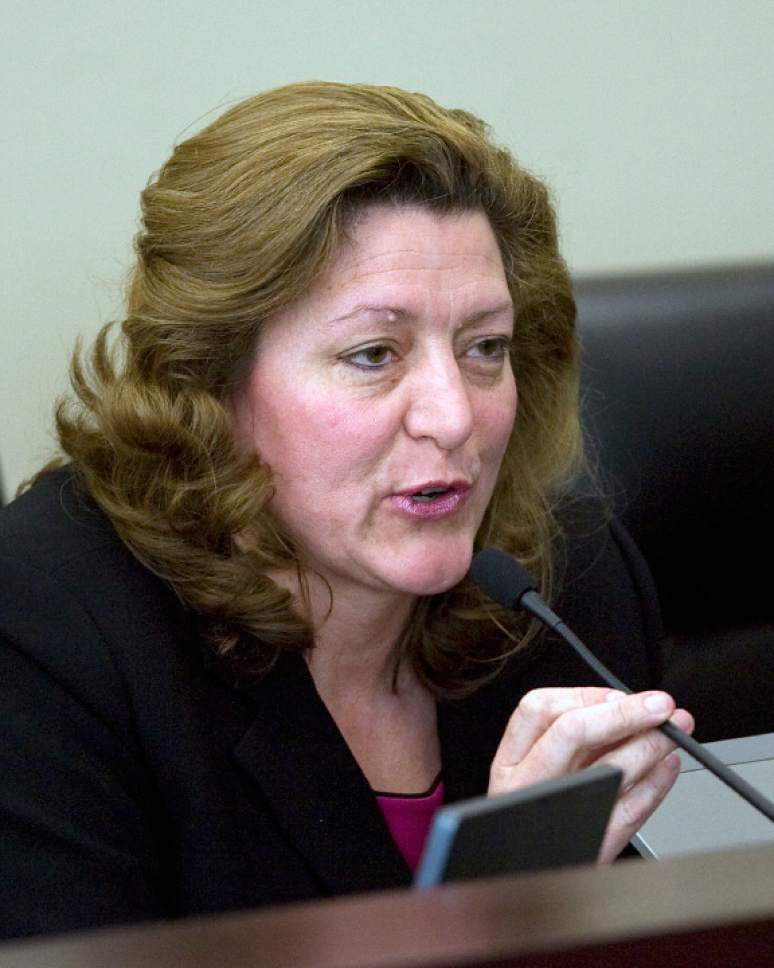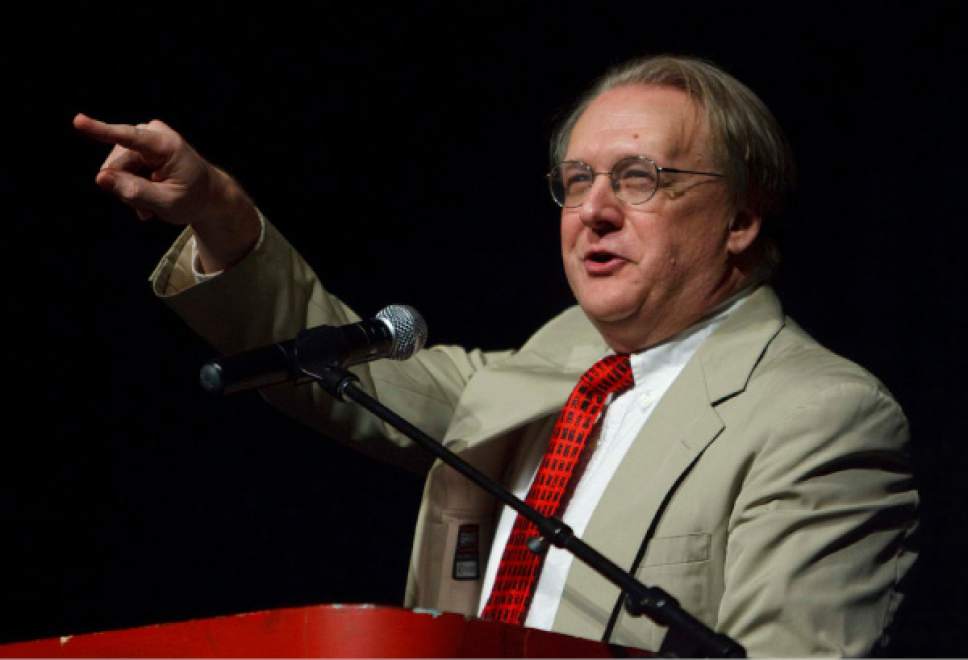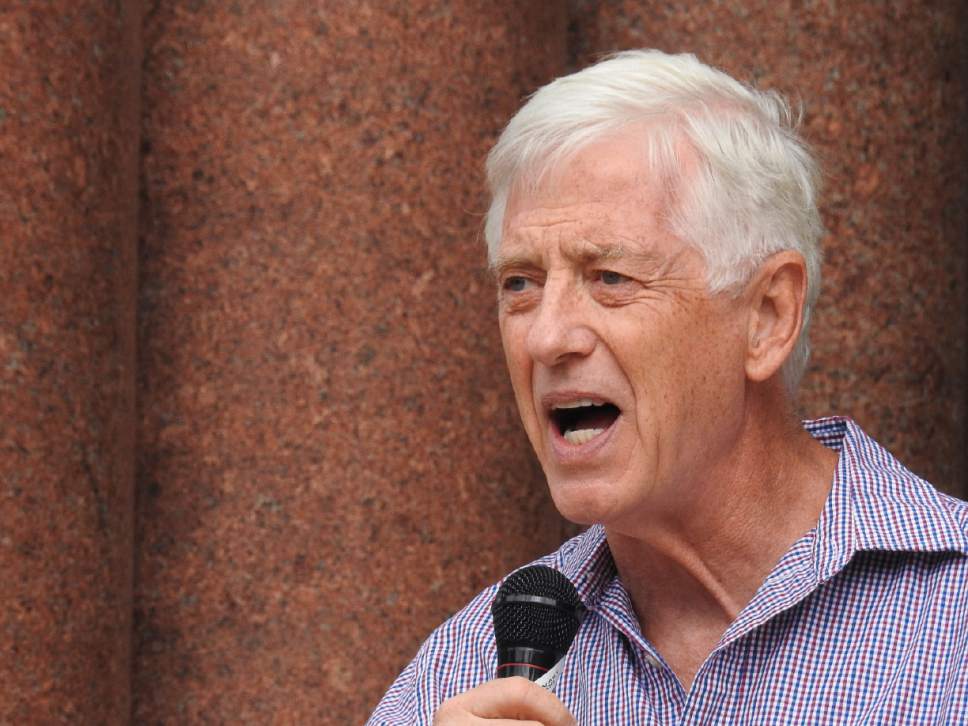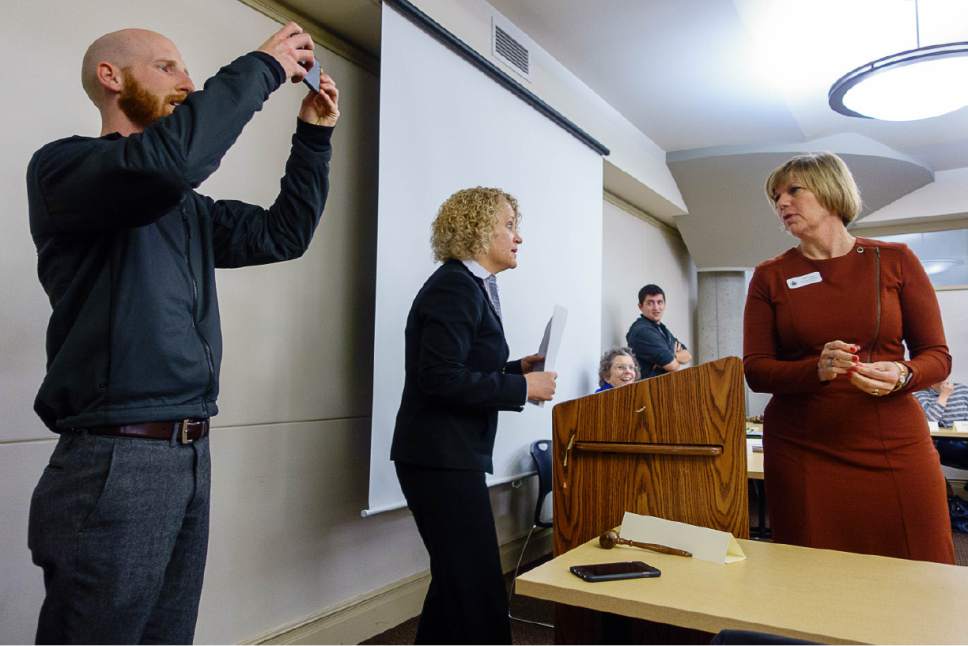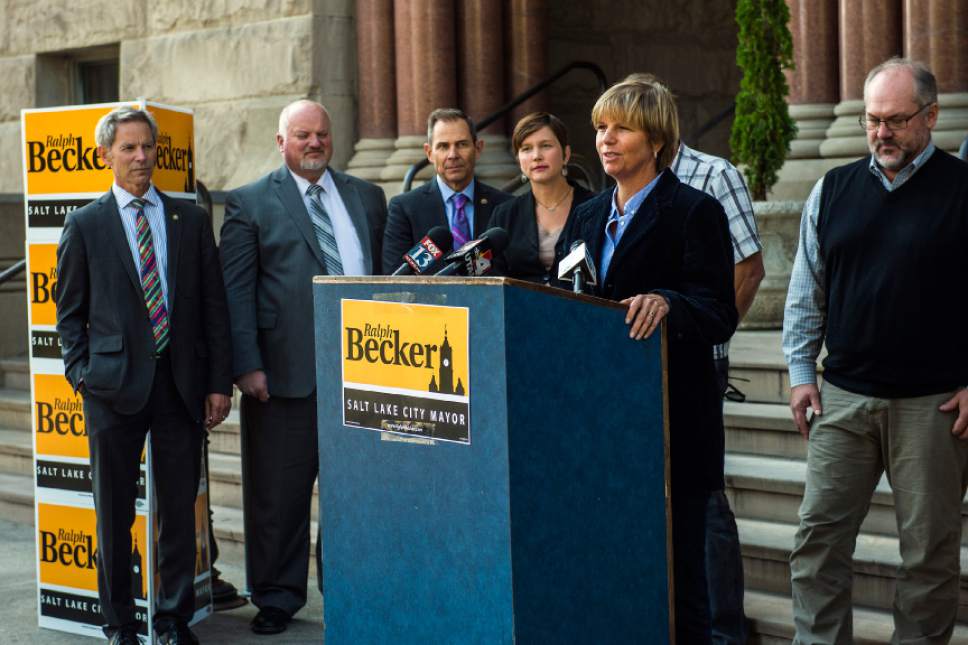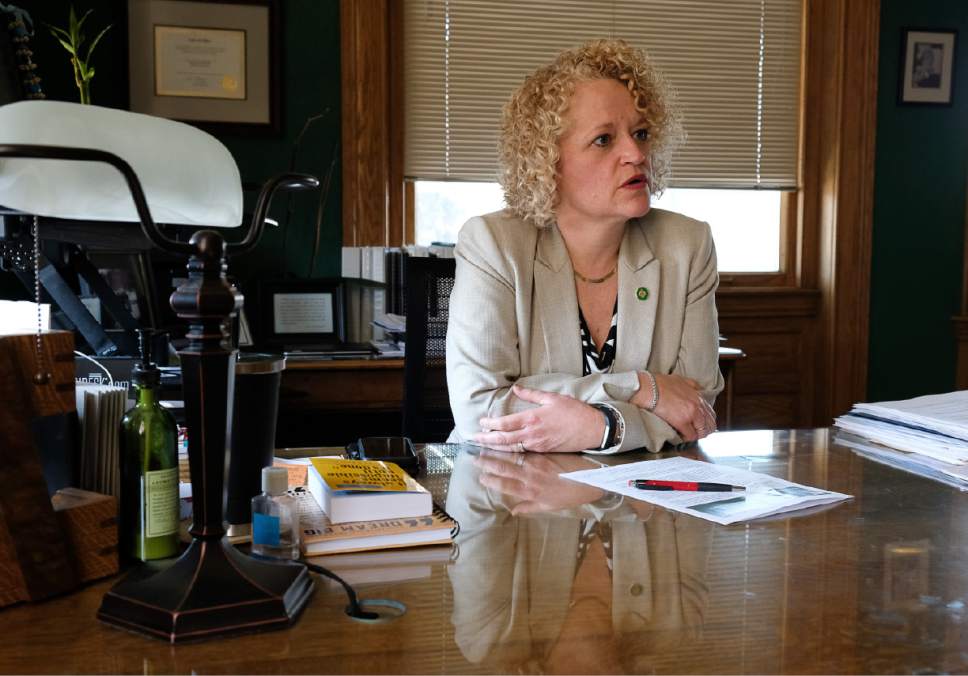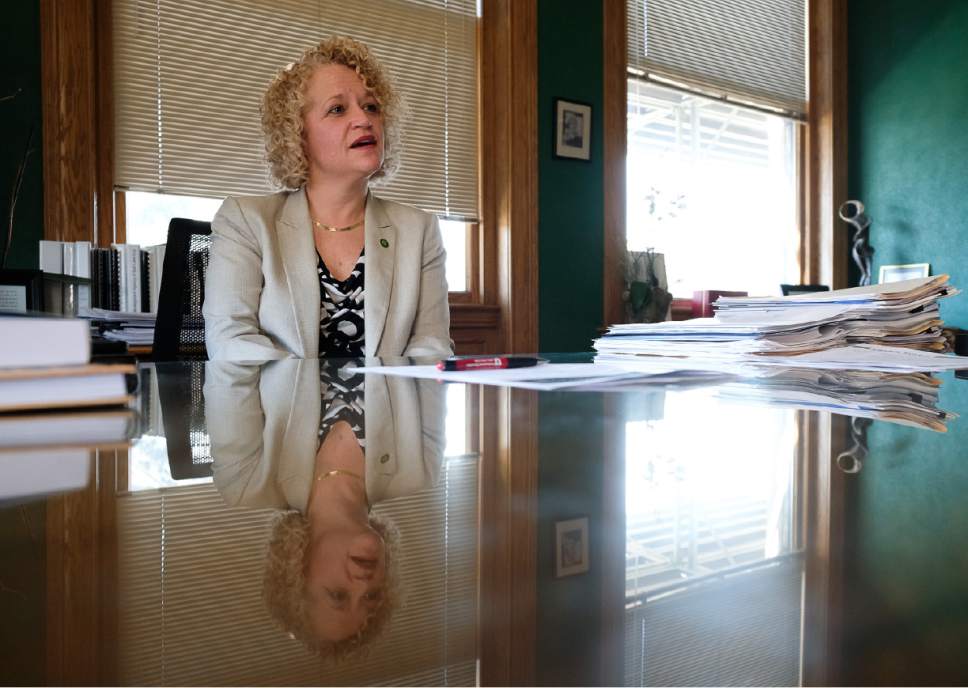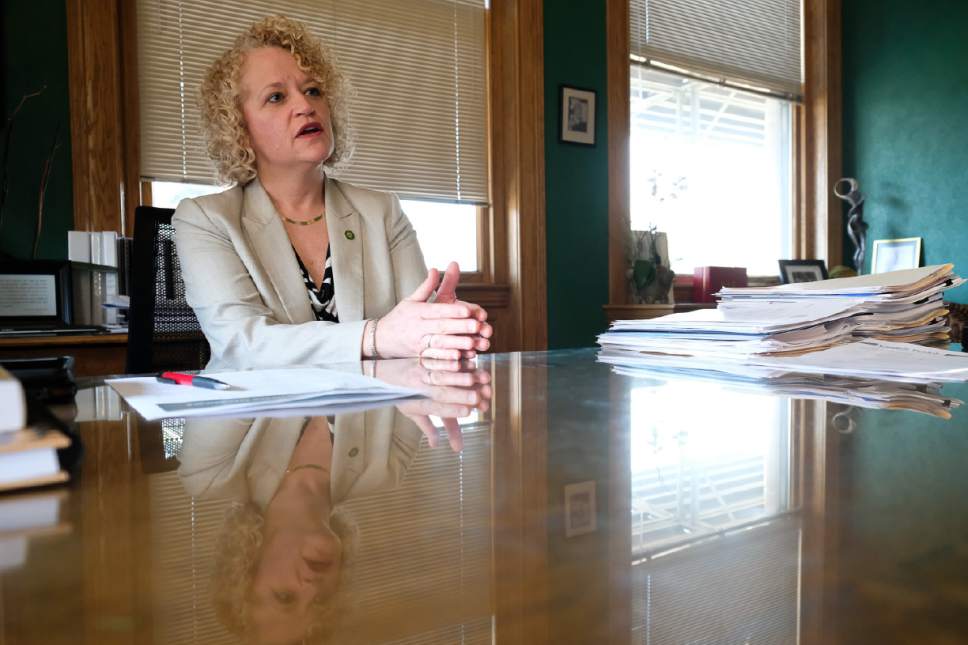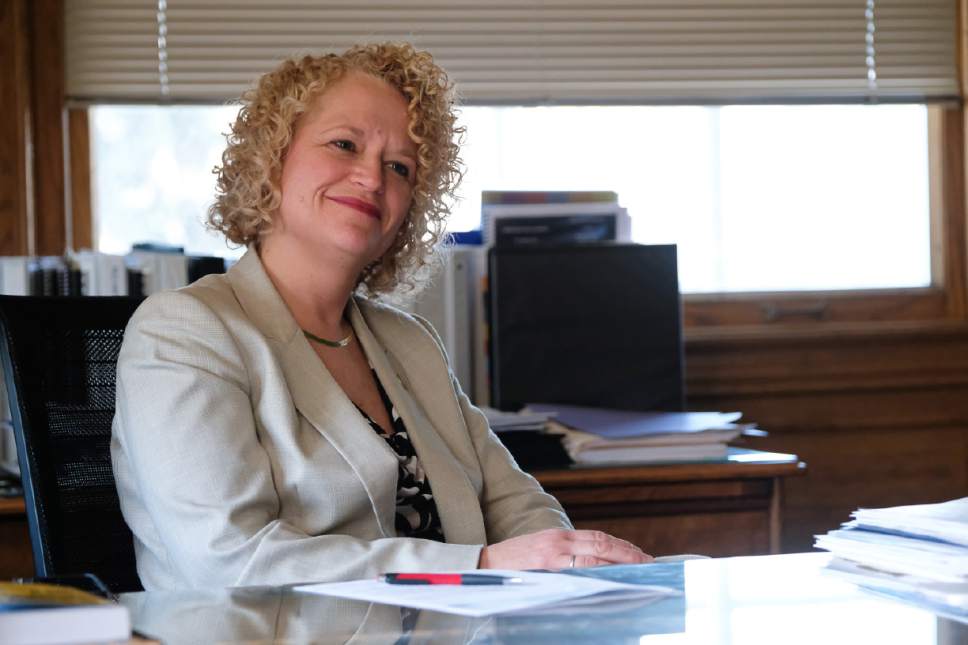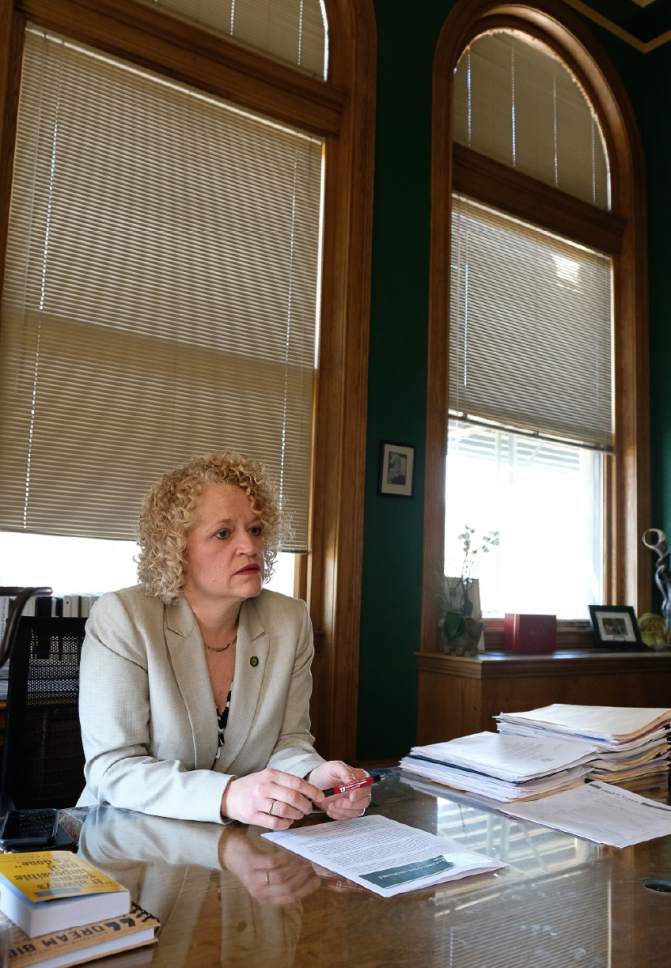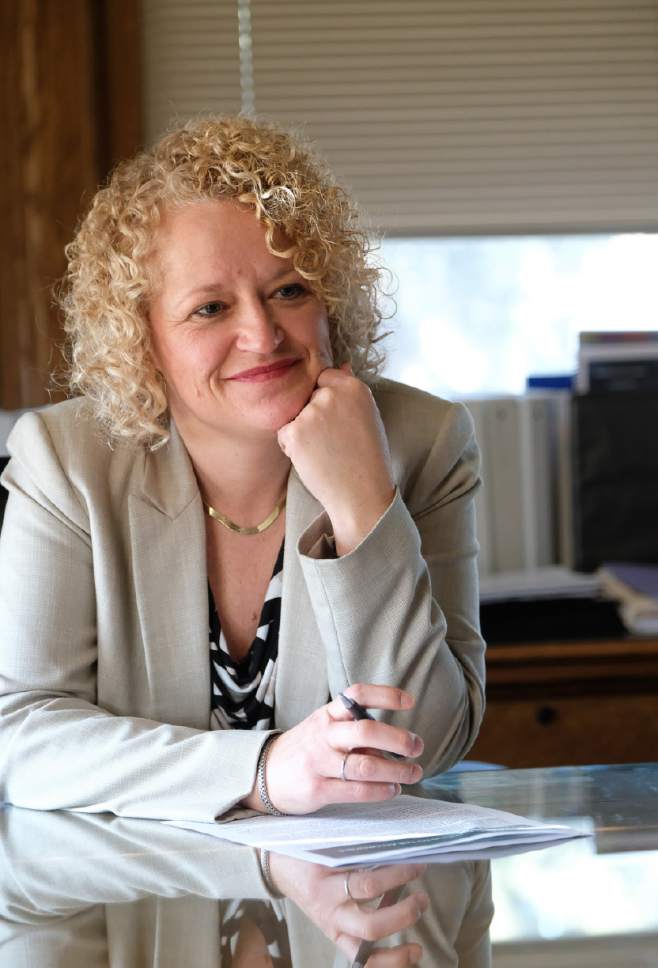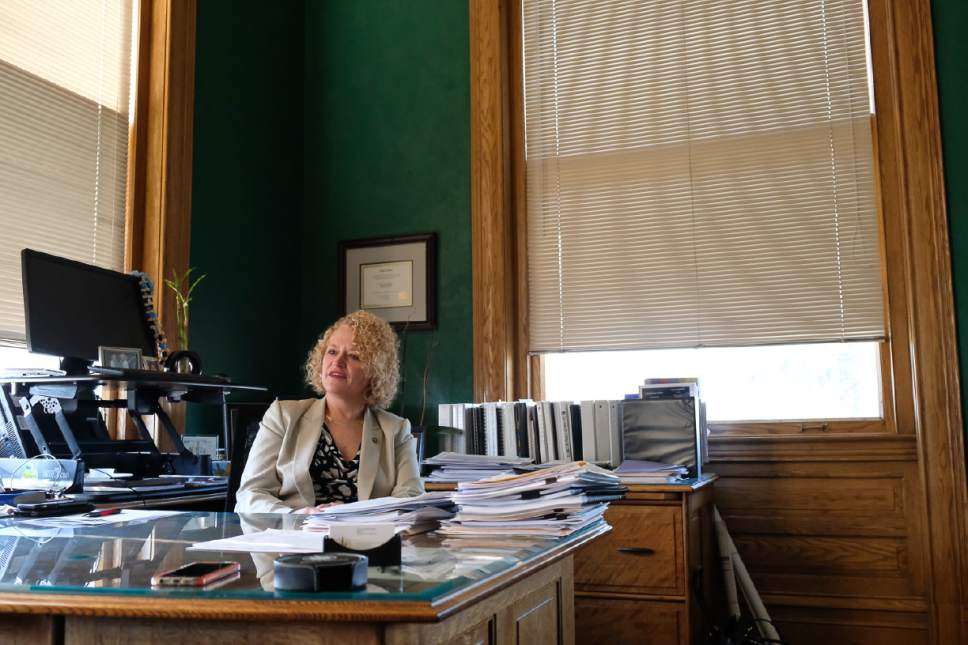This is an archived article that was published on sltrib.com in 2017, and information in the article may be outdated. It is provided only for personal research purposes and may not be reprinted.
Jackie Biskupski "loves" being Salt Lake City's mayor and expresses few regrets amid critiques of her collaborative skills that have recurred since the early days of her administration.
"What I really care about is the fact that when my team is picking up the phone, the majority of the phone calls are all positive, that the emails and mail I get is positive," Biskupski said when asked in mid-February about the public perception of her.
Since that interview, she's won a political victory by lessening Salt Lake City's share of county shelter beds in a twice-redrawn blueprint for reducing homelessness. The rollout of her housing plan has ended persistent queries about its status, and many of her stated aspirations align with those of leaders at the city, county and state levels.
Yet observers — former Biskupski backers among them — have expressed unease that she has come to embody the very things she once disparaged her predecessor for being: a closed-door deal-maker with little appetite for conversation or compromise.
Salt Lake City Councilwoman and Redevelopment Agency Board Chairwoman Lisa Adams said that, while the mayor seems to share a desire to do what's best for the city, "the administration's definition of collaboration is — 'You agree with me, and if you don't, then we're not collaborating.' "
—
Tough crowds • Biskupski has faced harsher criticisms.
Utah Eagle Forum President Gayle Ruzicka accused her of an "illegal lifestyle" in 1998, when she made a successful bid to become the state's first openly gay lawmaker.
In 2000, as Biskupski sought to persuade her House colleagues to defeat an adoption ban for gay or unmarried couples by pleading that "I am not less than human," they reportedly averted their eyes. Some turned their swivel chairs in the other direction.
She nonetheless forged a reputation for working with lawmakers on both sides of the aisle during her 12 years on Capitol Hill — a "serious legislator," said Tim Chambless, an associate professor with the University of Utah's political science department and the Hinckley Institute of Politics.
Former Salt Lake County Council Chairman Joe Hatch, who spurred on Biskupski's 1998 House run and donated $500 to her mayoral campaign in 2015, credits her for "incredible skills" as a lawmaker.
As an administrator, Hatch said, "the jury's still out."
Hatch told the apocryphal story of Josef Stalin's two letters to successor Nikita Khrushchev, to be opened after his first and second crises. The first advised Khrushchev: Blame me. The second: Write two letters.
"Jackie can blame a lot on [Ralph] Becker right now, and she should blame a lot on Becker," Hatch said, "but it's coming to a point where you're going to need to open that second letter."
The days that followed Biskupski's narrow November 2015 victory over Becker — the first incumbent to fall since the city adopted a mayor-council government in 1979 — hinted that while Biskupski was now dealing predominantly with fellow Democrats, she did not consider herself to be among allies.
Adams, who endorsed Becker, said she advised Biskupski to retain existing city staff until the completion of the budget cycle, and that three or four directors possessed invaluable talents and institutional knowledge.
Instead, Biskupski called for the resignation of all appointees. As for those specifically recommended by Adams, "she let every single one of them go," the councilwoman said.
It sent "a bad wave" through city government, Chambless said: "I wonder if, a year and a half later, she's recovered from that."
Former Salt Lake City Mayor Rocky Anderson said he had raised "many thousands" of dollars for Biskupski's campaign but that the forced resignations of longtime city staffers convinced him "she was more of a political animal than she was someone primarily interested in achieving great results for the people of the city."
Biskupski said that even if such a move was unprecedented here, it's not unusual. Asked about the directors whose resignations she accepted, she said only that her current Cabinet has impressed residents that "the city loves them back."
"That's new, and I think that's because of the people who work with me," she said, "and I'm proud of that."
—
Council clashes • "Now is the time," read the late-September email from then-Council Chairman James Rogers.
Rogers requested Biskupski's attendance at a meeting the next morning that would be followed closely by a news conference to trumpet a council-generated vision of four, not two, homeless shelters.
Biskupski replied that she would not have her hand forced and "present a false front that we are united." She showed up, but only after she was implored to do so by House Speaker Greg Hughes — this playing out as invited reporters waited in the hallway.
The episode was the most publicized glimpse of tensions that Council Vice Chairman Charlie Luke said he perceived from before Day One.
Luke, the only one of five returning members of the seven-seat council who didn't endorse Becker — he remained neutral — said he believes at times that disagreements with the mayor have become "personal," though he preferred not to detail his own interactions.
Under Becker, Adams said, she could disagree and "didn't ever feel like there was a grudge that was held."
"I wouldn't say that I felt like Jackie held a grudge," Adams said, "but she's hard to read."
Other frequent council gripes are that Biskupski doesn't seek members' input, hasn't moved fast enough to fill vacancies or propose policy guidelines, and sends nonexecutives to observe segments of council and RDA meetings on her behalf.
Adams recalled a work session last month when the mayor's staff was unaware it was due for a briefing that had been on the council's agenda for days. It's the mayor's job to check the council's agenda, she said.
"I guess we need to be like parents with kids doing their homework," Adams said. "'This is coming up, is it ready?'"
Luke said that whereas Becker empowered Chief of Staff David Everitt to "basically" run the city, Biskupski vowed to play a more hands-on role. That approach, coupled with the loss of institutional knowledge, has led to "hiccups," Luke said. "Whether it's the learning curve or whatever, things have slowed down quite a bit."
Biskupski acknowledged that the city's first housing plan since 2000 took longer than she had expected, but meaningful change required a "deep dive."
And while council members have asked that they be more involved in drafting administrative proposals — rather than demand significant changes in formal meetings — Biskupski cited the council's unilateral October decision to set aside $21 million from the RDA budget for affordable housing.
"What I would hope moving forward is if there's a sense that somehow we're not moving fast enough, that we have conversations about that," she said. "But fast doesn't necessarily mean effective or efficient."
—
Sites unseen • Hughes, a Draper Republican, has portrayed his role in unifying the state's most powerful Democrats to combat homelessness as one of his life's most difficult challenges.
Biskupski and a fellow Democrat, Salt Lake County Mayor Ben McAdams, said little about each other during a legislative session that was critical to the funding of their homeless solution, even during the recent announcement that Salt Lake City would be on the hook for just two, 200-bed shelters instead of four, 150-bed ones.
Both have experience working in the other's building — McAdams, as a former senior adviser to Becker, Biskupski, as a former administrator under Salt Lake County Sheriff Jim Winder.
McAdams' deputy mayor, Erin Litvack, is married to Biskupski's chief deputy, David Litvack.
But McAdams previously described an impasse on homelessness that developed over his criticisms of the city's $7 million agreement to buy one of the sites — since canceled — and Biskupski's desire to set a hard close date at the emergency shelter on Rio Grande Street. During a fall 2015 TV spot, he said that he wasn't sure Biskupski "has the vision or leadership" to replace Becker, a comment that he recently allowed "probably put some strain on mine and Jackie's relationship."
The two are "moving forward," Biskupski said in mid-February before repeating a call for the county to provide more information about its homeless-services concept.
The furor over last year's closed-to-the-public shelter siting decisions is still a sore subject for Biskupski, who wrote on her campaign website under "Why I'm running for mayor," "because I care about the people who live and work in this great city and how we are not being included in the decisions that affect our lives."
She and the council won a "Black Hole Award" from the Utah Headliners Chapter of the Society of Professional Journalists, and a mid-January Salt Lake Tribune-Hinckley Institute poll found half the voters felt the city had done a poor job courting public opinion on potential sites.
"To suggest that somehow we or I am not holding true to a value of mine because of this, I think is false," said Biskupski, adding that she didn't want to pit neighborhood against neighborhood in an open debate about who deserved a shelter. "I am very transparent and we work daily to be transparent on everything."
As proof, Biskupski points to a proposed policy of releasing police body camera footage in officer-involved shootings after no more than six months.
That proposal, however, drew a related complaint about her office from Salt Lake County District Attorney Sim Gill.
Gill, who believes the arbitrary cutoff could taint key evidence and make him less likely to try worthy cases, said he was notified just hours before Biskupski's office sent out a news release.
Anderson said Biskupski often allows staff to speak for her in media reports and that when the mayor's office objected to his comments about mass resignations, he received a call not from Biskupski, but from city spokesman Matthew Rojas.
Before that, she had never thanked him for his help with her campaign, he said.
"It's really odd to me how inaccessible she is, not only to her constituents, but to the public."
Anderson said there is nothing Biskupski can do to earn his vote in the next election.
—
'We are who we are' • Ogden City Councilwoman Marcia White knows Biskupski as an inspirational friend who sends handwritten Christmas cards and whose Minnesota accent gets thicker throughout the night.
She knows Biskupski can appear guarded, White said, but "it's more that she's just taking it all in."
Still, the mayor doesn't deny that her first foray into elective office took a toll on her trust level.
"When I first was elected, there were people who wanted me dead, and that's the late '90s," she said. "That's not that long ago. Now that I have children, I'm even more guarded. There will always be people who don't want you to be successful for whatever reason."
There is nothing she can do to win approval from some of the city's most conservative voters, Biskupski said. As for her frayed connection to the council, she said, she regularly schedules meetings with members and "always felt like those meetings were going well."
Former state Rep. Holly Richardson, a Utah County Republican, got her start in politics backing Biskupski's multiyear effort to legalize lay midwifery and said she knows the mayor as an effective communicator who "had learned how to stand her ground, but to do it in a way that wasn't offensive." Reported complaints about Biskupski's leadership techniques have left her bewildered.
"People seem to be so tough on her in ways that they aren't on others," Richardson said. "Right from the beginning, people were raking her over the coals."
Biskupski said the news media are generally inclined to negatively spin stories and that "we live in a time when people are looking for hope and they want to read about hope, they want to be inspired by hope, and we constantly are feeding pain and agony and frustration and demise, and it's hard."
She never expected her job to be easy, she said, and loves it nonetheless. Her perceived successes include the elevation of city economic development to its own department and the hiring of director Lara Fritts, signing a franchise agreement with Rocky Mountain Power, and defusing community tensions after the officer-involved shooting of Somali refugee Abdullahi "Abdi" Mohamed near the downtown shelter.
Her first year also saw major changes in her personal life: She married in August and lost her father in December.
"He was my champ. So that I carry with me daily," she said, adding that she is "very grateful" that changed laws allowed her to wed and start a new family with her wife and their adopted sons.
Chambless — who worked for former Mayor Ted Wilson and has observed the office for four decades — said Biskupski will likely become a better mayor, the same way she did as a lawmaker.
"She has the potential to improve, to learn, to work with others," he said. "That's how she survived."
And whether she improves or not, first-term City Councilman Andrew Johnston said the council has a responsibility to assess its approach, too. Biskupski has demonstrated "a very aggressive streak," he said, that is "a strong piece of who she is."
"If we're trying to change somebody else, we're going to fail," he said. "That doesn't work, especially in adults. Our neural circuitry is pretty fixed. We are who we are."
Biskupski, meanwhile, said her team's work "comes from a place of love." She became mayor to serve those in need of homes, jobs and opportunity, she said. Not to be liked.
"If I were to come in and ... not really move agendas and not get noticed very often, people would like me," she said. "They wouldn't really know why, but they would like me. At the end of the day, I didn't run to be mayor to just sit in my office and let things play out."
mpiper@sltrib.com Twitter: @matthew_piper


